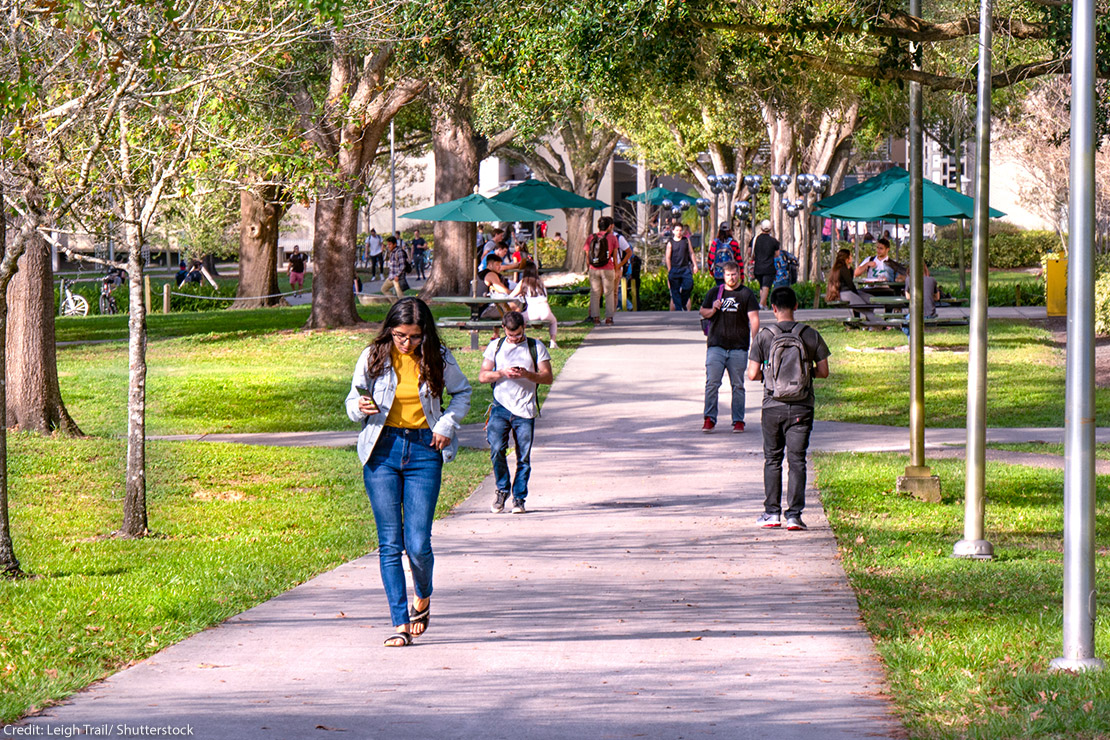College students, like everyone else, have the First Amendment right to express political opinions and advocate for causes they believe in. Colleges have long served as venues for students to exercise these rights, providing opportunities for exposure to diverse perspectives and expanding their understanding of themselves and the world.
Recent actions by Florida state authorities violate the First Amendment and pose a threat to these freedoms. In October 2023, Florida State University System Chancellor Ray Rodriguez, along with Governor Ron DeSantis, ordered Florida’s public universities to deactivate chapters of Students for Palestine Justice (SJP). There are more than 200 SJP chapters in the country, with two in Florida. In the order, President Rodriguez makes the unfounded allegation that Florida’s SJP chapter violated the state’s terrorism support law. This dangerous and stigmatizing allegation is based solely on constitutionally protected statements made by the National Students for Palestine Justice, a separate organization with no formal affiliation to the Florida SJP chapter.
The ACLU, ACLU of Florida, and the Palestine Law Office filed a lawsuit on behalf of the University of Florida (UF) chapter of SJP in response to Florida authorities’ attempt to punish students for speaking out in front of a national organization. UF SJP is an independent student advocacy group dedicated to organizing and educating the community about the struggle for Palestinian freedom. As its mission statement states, the group “seeks to organize diverse people of all faiths and nationalities who believe in the achievability of peace.”

University of Florida Students for Palestinian Justice v. Raymond Rodriguez
Source: American Civil Liberties Union
As the lawsuit makes clear, the Chancellor’s order to suspend the accounts clearly violates students’ First Amendment rights to freedom of speech and association. UF SJP’s lawsuit seeks to block these unconstitutional prohibitions and protect students’ rights to speak out on issues of urgent concern.
Here’s what you need to know about the case and how it could affect the future of free speech on college campuses across the country.
Why did Florida officials issue the deactivation order?
Our client, UF SJP, was not involved in drafting or distributing the National SJP Toolkit, nor has it used any of the language proposed in the document. Instead, they issued their own statement stating that “the taking of any life is always an undignified and heartbreaking act” and that “[v]Violence against any innocent life is unacceptable,” the UF SJP wrote, concluding, “We hope that no more Israeli or Palestinian lives are lost, and we pray for those who are suffering.” The group then, outraged by UF’s downplaying of the deaths of Palestinian civilians in Gaza and its failure to support Palestinian and Muslim students on campus, called on the university to “condemn all violence, anti-Semitism, Islamophobia, Palestinian erasure, and anti-Palestinian sentiment.”
Surprisingly, the deactivation order does not allege or even suggest that UF SJP violated any law or policy that would justify dissolving the chapter.
In essence, Florida officials are trying to censor and punish these students for the political statements of another group, even though that group’s speech is itself protected by the First Amendment.
Why would a suspension order violate a student organization’s First Amendment rights?
“Students and faculty at public universities have a First Amendment right to self-expression, including the freedom to express their views in opposition to government policies and to advocate for causes or causes they believe in. Florida’s suspension orders are a blatant violation of this right.”
The Supreme Court has repeatedly upheld students’ right to free speech, including in times of crisis. For example, in 1972, in Healy v. James, the Supreme Court affirmed that the First Amendment protects the right of student organizations to associate and speak on matters of public concern without censorship by public university authorities. As the Supreme Court stated, “Nowhere is free speech more important than in our nation’s leading institutions of higher learning.” The Court also ruled that public universities cannot refuse to recognize local chapters (such as UF SJP) because of their affiliation with a national organization or based on the views of any organization.
How will the suspension order negatively impact the Students for Justice in Palestine?
As the death toll in Gaza soars daily, UF SJP believes its work to defend Palestinian human rights is urgent and ongoing, but the threat of suspension still looms, limiting the student group’s ability to organize itself and others to support its work.
Since the suspension was issued, UF SJP’s funding has been in limbo. The organization’s only source of funding is the university’s student government, which only provides funding to registered student groups. The suspension means the organization will lose this funding, meaning it can no longer bring speakers to campus, print promotional materials for events or recruitment, or even provide food at events.
In addition to worries about funding, the group is also concerned about recruiting members because it relies on a school-controlled communications service: Only registered student organizations can post information on GatorConnect, a University of Florida website students visit for information about student organizations and upcoming events.
Florida state officials have accused the student organization of providing “material support to terrorism,” and current and potential members fear the devastating consequences this stigmatizing label could have on their lives and activities.
Why does this case set a precedent for how we think about free speech on campus?
Florida authorities’ order to suspend the accounts poses a direct threat to students’ ability to speak out and express their opinions about the rapidly deteriorating situation in Palestine.
In a time of rising political tensions and global crisis, it is critical for university leaders to protect free speech, open debate, and peaceful dissent on their campuses. Yet efforts to punish and silence pro-Palestinian students and professors who speak out against Israeli and US government policies are on the rise across the country.
These efforts include:
In December 2023, Rutgers University suspended its chapter of Students for Justice in Palestine (SJP). It said the university had received complaints that the group was disrupting campus life and causing anxiety among students and staff. Rutgers SJP denied these allegations. The chapter has since been reinstated, but remains on probation until December 2024. In Indiana, a tenured professor of political science and Middle Eastern studies was barred from teaching until next fall after incorrectly filling out a room request form for an event hosted by the Palestine Solidarity Committee. The University of Michigan recently canceled a student election on a resolution related to Palestine and Israel, restricted or closed a student email listserver where students were discussing the international crisis, removed posters expressing support for the Palestinians from the windows of graduate students’ offices, and responded to campus protests and sit-ins with aggressive security and punitive discipline.
What happens next?
We hope the Court will recognize Florida’s suspension order as a blatant and harmful attempt to censor pro-Palestinian speech on campus in violation of the Constitution. Florida’s ban on student organizations exercising free speech is dangerous and wrong. Such actions could lead to further censorship and discrimination at our campus and across the nation. Therefore, we urge university leaders to remember that they are custodians of a democracy and a constitution, and that free speech principles mandate that they protect the rights of everyone, not just those they agree with.
For over 100 years, the ACLU has fought for freedom of speech and association while opposing all forms of government censorship. We believe students have a right to speak, and we will always protect that right.

